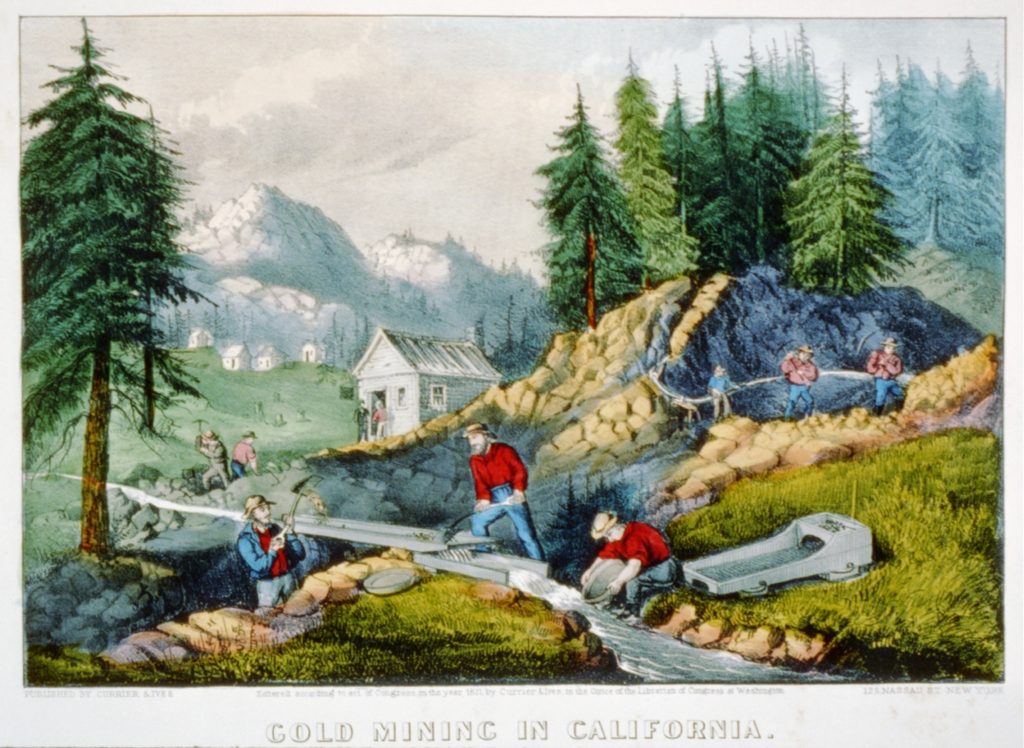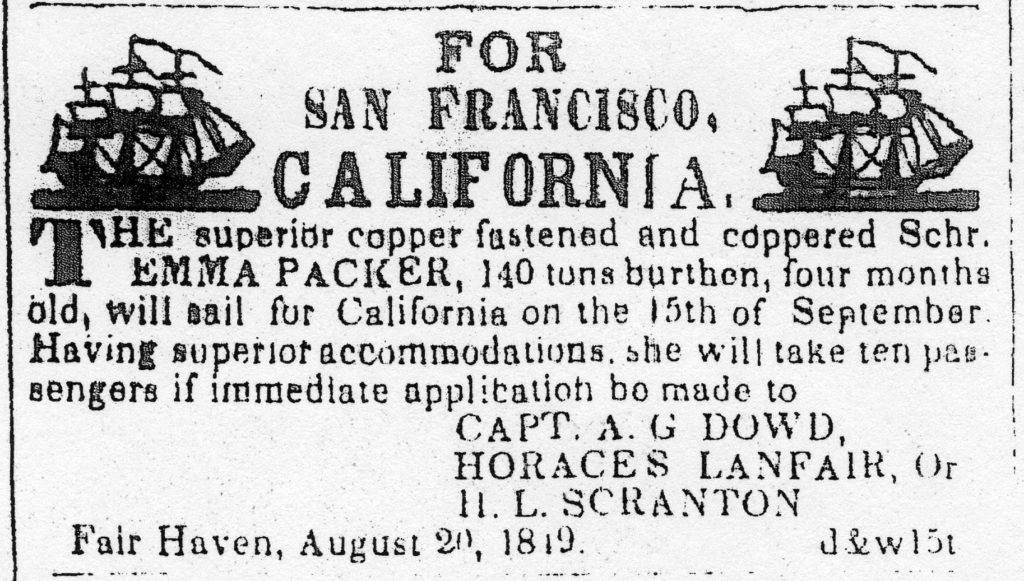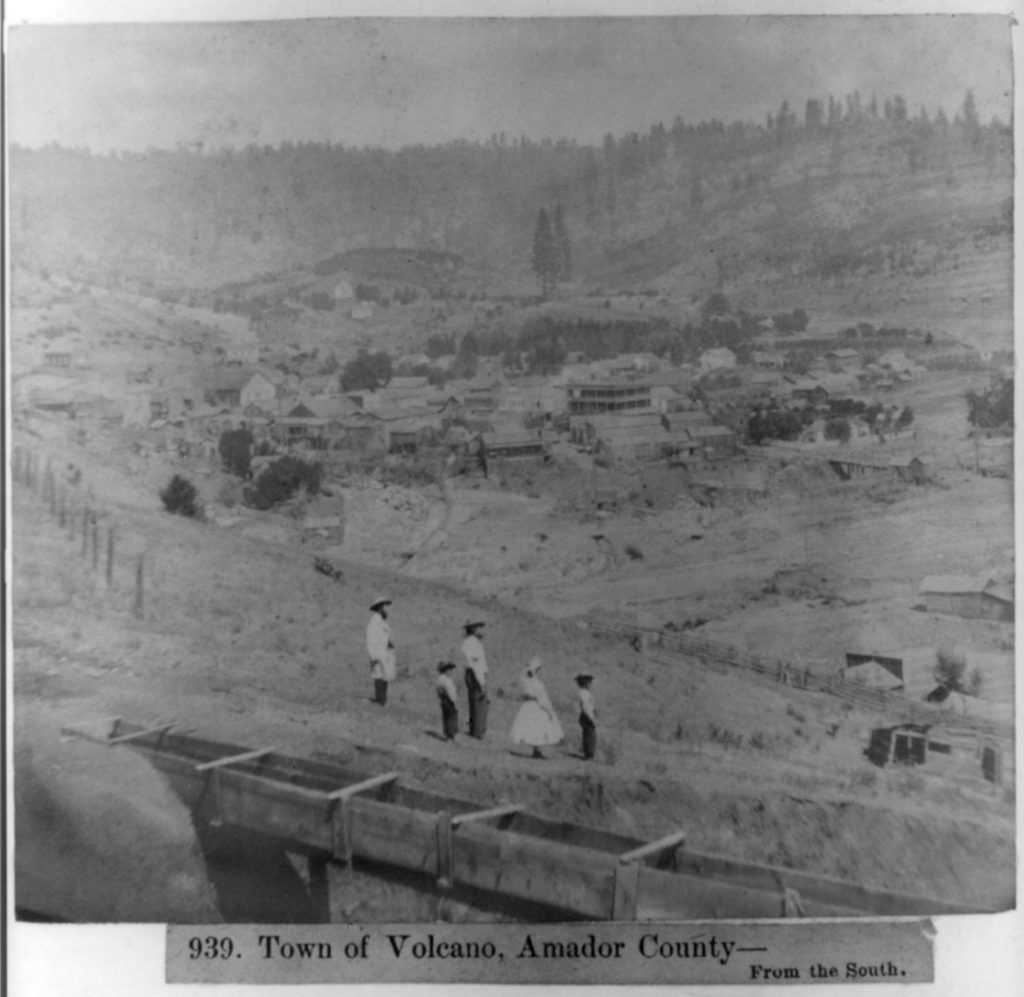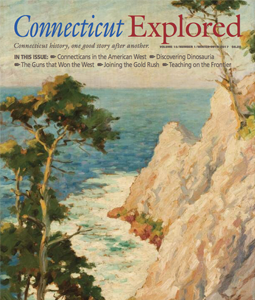
Currier & Ives, Gold mining in California, c. 1871. Library of Congress Prints and Photographs Division
By Elizabeth Normen
(c) Connecticut Explored Inc. Winter 2016-2017
SUBSCRIBE/Buy the Issue!
John Eli Brockett was born in North Haven in 1828. He bore the name of his ancestor, one of New Haven’s first settlers (John Brockett, 1612 – 1690). In September 1849, Brockett left Connecticut and headed to the gold fields of California.
Over the course of four years there, he wrote more than 200 letters home to his family in North Haven. The letters were transcribed (and punctuation inserted, with some revision of wording) by yet another John E. Brockett from 1950 until his death in 1972. The latter Brockett’s son William R. Brockett published the letters with the assistance of Katharine L. Brown, in 2007. The excerpts here, as published, are used by permission.

Brockett may have responded to this ad. He booked passage on the “Emma Packer” to California, departing September 26, 1849. Courtesy of William Brockett
The discovery of gold in California in early 1848 was big news the world over. According to Katharine Brown in John E. Brockett’s Gold Rush Journey, 1849 – 1853 (Lot’s Wife Publishing, 2007), New Haven’s newspapers enthusiastically covered the discovery. They also carried advertisements from local businesses catering to the new market for equipment, books, and clothing for those headed west. “F. Chatterton & Co. on Fleet Street offered India rubber coats, pants, gloves, bags, life preservers, oil clothing,” Brown notes, “in fact, ‘everything in the way of Ready Made Clothing, suitable for an outfit for California’” as one advertisement read in the New Haven Journal and Courier (February 2, 1849). Ships advertised passage. Companies formed in the New Haven area and elsewhere to organized groups of miners for the venture. The Quinnipiac Mining and Trading Company planned to send supplies for their group by ship and send prospective miners overland on a kind of tour to see Mexico, the battlefields of the Mexican-American War (1846 – 1848), and the newly acquired territory along the way. Some companies formed to either build or purchase a ship and then sought subscribers for the voyage to California. The typical cost for passage from New Haven and provisions for a 2-year sojourn in the gold fields was $500.
Of 13 men from North Haven who went to California to mine, Brockett was one of the last to go, in early fall 1849. He took time to plan and save money. He outfitted himself and booked his own passage on the newly built Emma Packer. Of the $405.81 he allocated for the trip, $150 paid for the passage, and he carried $154 in cash. He bought a life insurance policy for $25. Besides clothing, he purchased in New Haven two “gold washers,” six tin pans, a pail, cup, and dipper totaling $3.18. An unusual listing was 50 pair of men’s slippers at 60 cents each. These he purchased from his father, a shoemaker, to resell in California.
He set sail from Fair Haven on September 26, 1849. The voyage took 171 days. He celebrated his 22nd birthday en route and arrived in March 1850. On April 4, he wrote in a letter home:
On my arrival at San Francisco we found mud to our knees at every step and if you did not look sharp, something else. The hills were speckled with tents occupied by new arrivals preparing to leave for the mines. There may be 500 wooden buildings cheaply constructed. Hundreds of them are occupied by saloons and gambling tables. …The stories we heard of gold ranged from a fortune a day to “nuthin” and many said, “Take the first boat for home while you have got passage money.” We elected to “take the first boat for the diggings” and try for the fortune.
He encountered middling success, writing in May, “I can live easily for I can earn my board in two hours anytime, but I want ‘money in my pocket’ too.” By June, however, he’d had little luck, was sick, and considered returning home with fellow North Havenite Henry Fowler, who, having arrived earlier, was going home with $5,000 in gold.
He stayed and in July, from Murderer’s Bar on the middle fork of the American River, he wrote:
For two miles up and down the river claims are staked out on each bank, 15 feet wide to a man, and it is supposed to be very rich at low water. There are companies here that have claims that can be worked now that are making their hundred dollars a day, but these, remember, are a few among thousands who are working hard to make a bare living. … I do not expect any fortune. I do hope to make enough to come home in November and be even if no more. Gold is not to be obtained merely by washing a pan of sand… but by lifting and rolling over rocks and stones and picking and shoveling off dirt before you come down to the gold sand. And this is no easy matter in a country where the thermometer ranges from ninety to one hundred and twenty at mid-day and the nights are so cold that one needs two good blankets around him.
 January 1851 found Brockett mining near Volcano. His fortunes had turned for the better and by early June he had made a couple thousand dollars. In February he wrote,
January 1851 found Brockett mining near Volcano. His fortunes had turned for the better and by early June he had made a couple thousand dollars. In February he wrote,
We are all mud from head to foot and can’t keep clear of it. We are doing good business. The first week of January we dug $200, the second $250, the third $225 and the fourth $400. … We are finding some fine specimens and clear lumps. … We are working a steep bank in a gulch, quite alone, and nobody knows we make more than two or three dollars. … There is a great deal of gambling and stealing going on about here and hangings are very common.
Brockett returned home in September 1853. That June he summed up his experience, writing:
I am sick of mining … I suppose there is interest growing in the money you have put in the bank for me. Do as you think best with any or all of it. … I think with the money I have got and good health I can make an easy living at home now. And I am about decided not to come back to California once I do leave. Though how I can ever settle down to the small returns I will gain in Connecticut, I really do not know. I can and will though,
From your affectionate son, John
A hardened 26-year-old Brocket did not return a rich man but he had earned enough to help pay off some of his father’s debts and with some left over. He married Susan Heaton in May 1857 and had a family. He died at home  in North Haven in 1910 at the age of 82.
in North Haven in 1910 at the age of 82.
Elizabeth Normen is publisher of Connecticut Explored.
Read more about Connecticans in the American West or
